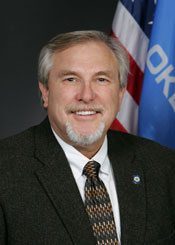BY DAVID PERRYMAN
 According to a Mar. 24 article in the Oklahoman, Preston Doerflinger, Gov. Fallin’s Secretary of Finance and chief budget planner, said the state of Oklahoma needs a new, permanent source of money to be a reliable source of “recurring revenue.” He was talking about taxes.
According to a Mar. 24 article in the Oklahoman, Preston Doerflinger, Gov. Fallin’s Secretary of Finance and chief budget planner, said the state of Oklahoma needs a new, permanent source of money to be a reliable source of “recurring revenue.” He was talking about taxes.
For you and me, a reliable source of recurring revenue is a job, preferably with benefits.
For Oklahoma’s rural hospitals that can’t turn anyone away and are required by law to treat anyone who shows up regardless of ability to pay, a reliable source of recurring revenue would be patients who could either pay cash or have some form of insurance to pay for care and treatment.
Some say that rural hospitals are businesses just like any other business; however, no business could survive if it was continuously required to provide services in excess of revenue.
So how bad is it? According to information released this week by the Oklahoma Hospital Association, 42 of Oklahoma’s 76 rural hospitals are at risk of closing as did hospitals recently in Sayre and Frederick. A number of other Oklahoma hospitals have filed bankruptcy.
The health care industry provides nearly 10% of Oklahoma’s jobs statewide. In rural communities the percentage of the total workforce is often greater because the hospital is an economic engine that allows clinics and a myriad of other health care product and service providers to locate in close proximity and work hand in hand.
The crisis does not end there. How likely is it that a rural community that has no hospital can recruit industry when competing with a community that does?
For nearly four years, Oklahoma has turned its back on accepting federal funding to provide Medicaid to working Oklahomans who earn between $9,500 and 138% of the federal poverty level. Remember, these are working Oklahomans whose employers do not provide insurance and who have no access to insurance coverage.
Consequently, they use the nearest hospital emergency room as their physician, leaving the hospital with more red ink in the form of uncompensated care.
In a Mar. 26 editorial in the Tulsa World, Fred Morgan, president and CEO of the Oklahoma State Chamber, suggested that Oklahoma “seek new sources of funding so that hospitals can continue to treat all of Oklahoma’s residents.” Mr. Morgan was not suggesting that rural hospitals open tire and lube shops in their vacant wings.
All but a dozen or so states are already accepting federal dollars. Oklahoma has a chance to do that. Accepting such funding will create more than 24,000 jobs across Oklahoma and will literally save tens of thousands more. Not only do those federal funds provide payments to hospitals and other medical providers, they also include coverage for mental health issues.
Making the situation even more critical is the fact that a bill in the state Senate [HB 2665] will remove 111,000 Oklahomans who earn less than $9,500 per year and care for dependent family members from the Medicaid rolls and, as of last Friday, the Oklahoma Department of Mental Health and Substance Abuse announced that the care and treatment of more than 72,000 mentally ill Oklahomans would be cut back or terminated because of budget cuts.
With rural health care on life support, these dollars are essential. This reliable source of recurring revenue may be too late for the many hospitals that are closed, but the hospital they save may someday be the hospital that saves your loved one’s life.
– David Perryman, a Chickasha Democrat, serves District 56 in the Oklahoma House
Editor’s Note: HB 2665 is scheduled to be heard today [Mar. 28] in the Senate Committee on Health and Human Services, meeting in the Capitol’s Room 535 right after the 1:30 p.m. full Senate session.
Update: The Senate committee on Monday voted 5-3 to kill HB 2665 – great news in an otherwise mostly abysmal legislative session.







